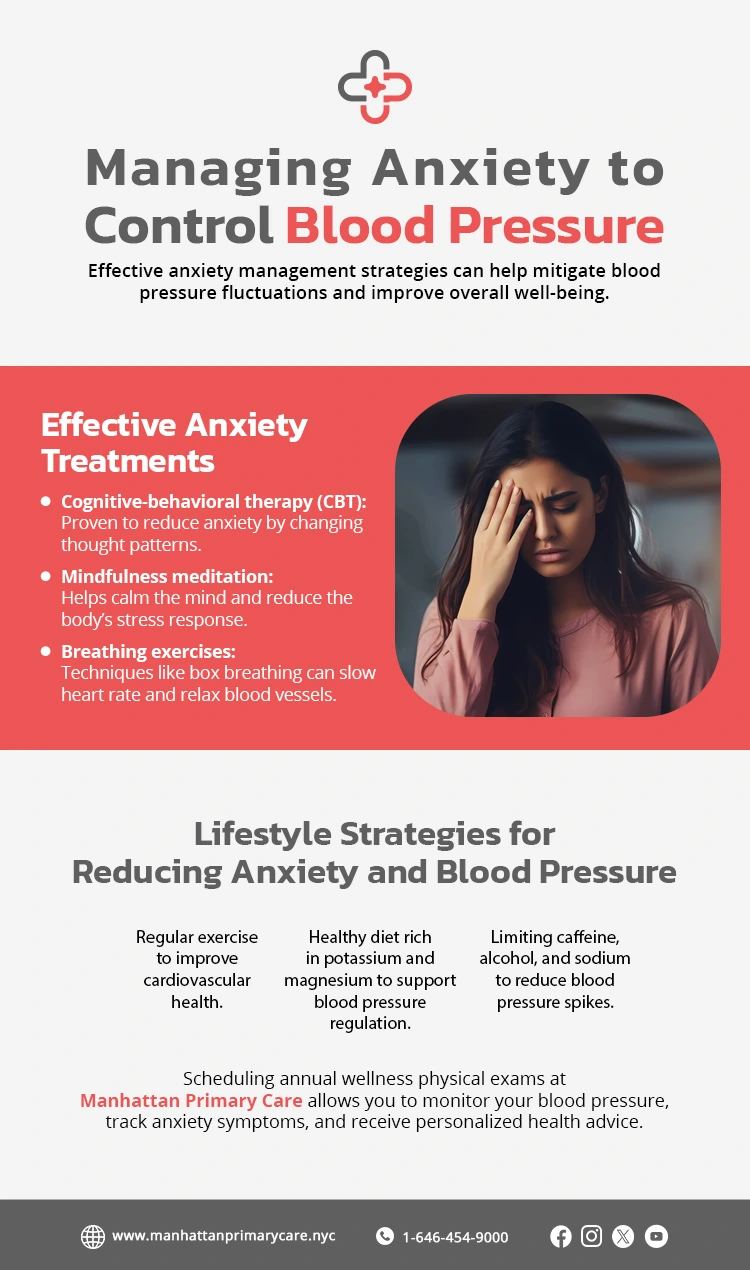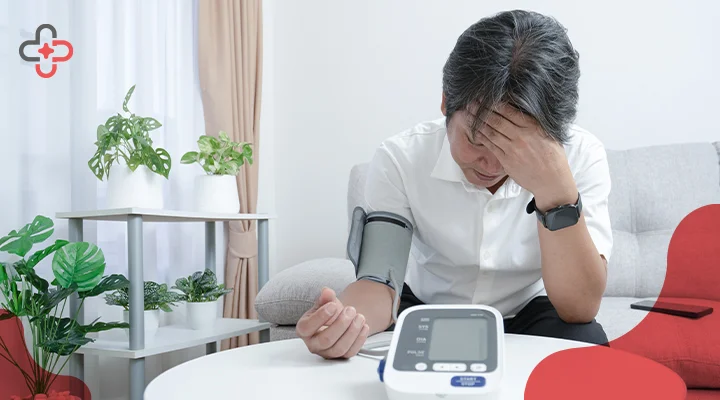Your heart’s racing, your chest feels tight, and your thoughts are spinning. Could anxiety be affecting your blood pressure, too? While anxiety may seem like just a mental health issue, it can have a direct impact on your heart and blood vessels.
Anxiety doesn’t typically cause chronic hypertension, but it can trigger temporary spikes in blood pressure that may be concerning. Let’s explore the link between anxiety and blood pressure, address common questions, and uncover ways to manage anxiety effectively to support your cardiovascular health.
Can Anxiety Cause High Blood Pressure?
Studies have shown that anxiety can lead to temporary spikes in blood pressure, particularly during acute stress episodes, as the body’s stress response triggers hormonal changes that affect the cardiovascular system.
Why Anxiety Raises Blood Pressure?
Anxiety activates the body’s “fight or flight” response, releasing stress hormones like adrenaline and cortisol. These hormones trigger:
- Narrowing of blood vessels (vasoconstriction)
- Increased heart rate
- Temporary blood pressure elevation
Key Insight: While these spikes are generally short-term, frequent episodes of anxiety may place strain on the cardiovascular system over time.
If you’re concerned about anxiety’s impact on your overall well-being, Manhattan Primary Care offers expert evaluations and personalized care to address both mental and physical health concerns, including effective chronic disease management strategies.
Can Anxiety Cause High Diastolic Blood Pressure?
Diastolic blood pressure refers to the pressure in your arteries between heartbeats. Anxiety-driven vasoconstriction may temporarily raise diastolic pressure.
Chronic Anxiety’s Impact on Diastolic Pressure
Repeated exposure to anxiety-related stress can gradually elevate diastolic blood pressure by continuously activating the stress response system.
Can Anxiety Cause Low Blood Pressure?
While anxiety is more commonly linked to blood pressure spikes, some individuals may experience sudden drops in blood pressure following intense panic attacks.
Symptoms of Anxiety-Induced Low Blood Pressure
- Dizziness
- Lightheadedness
- Fainting spells
Why Does It Happen?
During a panic attack, hyperventilation may reduce carbon dioxide levels, causing blood vessels to dilate and blood pressure to drop.
Anxiety Symptoms That May Mimic Heart Problems
Anxiety can produce physical symptoms that resemble those of cardiovascular issues, including:
- Chest tightness or pain
- Palpitations and racing heart
- Shortness of breath
- Dizziness or nausea
Key Insight: While anxiety can mimic heart attack symptoms, distinguishing between the two is crucial. Persistent symptoms should always warrant cardiovascular screening. Manhattan Primary Care provides comprehensive health assessments to ensure you receive accurate diagnoses and care.
How Anxiety and Hypertension Are Linked?
While anxiety alone may not cause chronic hypertension, it can:
- Worsen existing high blood pressure
- Contribute to unhealthy coping habits like overeating, smoking, or avoiding exercise
- Reduce your ability to manage chronic stress, which is a significant risk factor for cardiovascular disease.
Chronic disease management strategies offered by Manhattan Primary Care can help address these concerns by combining anxiety control with cardiovascular care.
Managing Anxiety to Control Blood Pressure
Effective anxiety management strategies can help mitigate blood pressure fluctuations and improve overall well-being.


Effective Anxiety Treatments
- Cognitive-behavioral therapy (CBT): Proven to reduce anxiety by changing thought patterns.
- Mindfulness meditation: Helps calm the mind and reduce the body’s stress response.
- Breathing exercises: Techniques like box breathing can slow heart rate and relax blood vessels.
Lifestyle Strategies for Reducing Anxiety and Blood Pressure
- Regular exercise to improve cardiovascular health.
- Healthy diet rich in potassium and magnesium to support blood pressure regulation.
- Limiting caffeine, alcohol, and sodium to reduce blood pressure spikes.
- Scheduling annual wellness physical exams at Manhattan Primary Care allows you to monitor your blood pressure, track anxiety symptoms, and receive personalized health advice.
When to See a Doctor for Anxiety and Blood Pressure Concerns
Seek medical attention if you experience:
- Frequent blood pressure spikes
- Chest pain, dizziness, or fainting
- Persistent anxiety that interferes with daily life
Medical Support Options
- Blood pressure medications may be necessary if anxiety management alone isn’t sufficient.
- Counseling or therapy can help manage anxiety in the long term.
For those seeking comprehensive care to address anxiety, hypertension, and overall well-being, Manhattan Primary Care is dedicated to providing patient-centered solutions. Regular preventive care check-ups can also identify early signs of blood pressure problems before they become serious concerns.
Conclusion
Anxiety can trigger temporary blood pressure spikes, but long-term effects may require lifestyle changes or medical treatment. Managing anxiety through therapy, mindfulness, and healthy habits can improve both mental health and heart health.
If you frequently experience anxiety-induced symptoms, consult your doctor for a thorough cardiovascular screening and personalized care plan. For expert support, Manhattan Primary Care offers compassionate and effective care tailored to your needs.
Frequently Asked Questions
Can anxiety medication affect blood pressure?
Yes, some anxiety medications may raise or lower blood pressure. Consult your doctor for guidance.
Are natural supplements effective for anxiety and blood pressure?
Supplements like magnesium, omega-3s, and ashwagandha may help, but consult your doctor first.
Can anxiety during sleep impact blood pressure?
Yes, anxiety can trigger nighttime BP spikes due to increased cortisol levels.
Does yoga or meditation reduce anxiety-induced BP spikes?
Yes, yoga and meditation can help lower stress hormones and stabilize blood pressure.
Disclaimer
This blog is for informational & educational purposes only and does not intend to substitute any professional medical advice or consultation. For any health-related concerns, please consult with your physician, or call 911.
